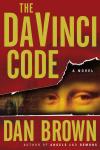I want to assure you that this isnt the time for Christians to get anxious or lose hope. This isnt the reason to boycott theatres or burn books. However, we neednt ignore whats going on. Our culture seems to have a new interest in knowing Jesus Christ, so we ought to be cheerfully and optimistically engaging in the conversation.
 On his website, the author of Da Vinci Code, Dan Brown, answers common questions ...
On his website, the author of Da Vinci Code, Dan Brown, answers common questions ...
HOW MUCH OF THIS NOVEL IS TRUE? - The Da Vinci Code is a novel and therefore a work of fiction. While the book's characters and their actions are obviously not real, the artwork, architecture, documents, and secret rituals depicted in this novel all exist (for example, Leonardo Da Vinci's paintings, the Gnostic Gospels, Hieros Gamos, etc.). These real elements are interpreted and debated by fictional characters. While it is my belief that some of the theories discussed by these characters may have merit, each individual reader must explore these characters' viewpoints and come to his or her own interpretations. My hope in writing this novel was that the story would serve as a catalyst and a springboard for people to discuss the important topics of faith, religion, and history.
Lets take Browns suggestion to heart and "discuss the important topics of faith, religion, and history." And this might be a good moment to point out that not everything about the artwork, architecture, (and especially) the documents and secret rituals depicted in the novel all exist. What about these Gnostic Gospels for example? And who are these Gnostics anyway? Why do they write their name with a silent G?
One of the characters in the novel describes the Gnostics and their so-called Gospels thus ...
Fortunately for historians ... some of the gospels that [Emperor] Constantine attempted to eradicate managed to survive. The Dead Sea Scrolls were found in the 1950s hidden in a cave near Qumran in the Judean desert. And of course, the Coptic Scrolls in 1945 at Nag Hammadi ... These documents speak of Christs ministry in very human terms ... The scrolls highlight glaring historical discrepancies and fabrications, clearly confirming that the modern Bible was compiled and edited by men who possessed a political agenda ... (p. 234)
Heres the problem when fictional characters discuss supposed facts: the line between fact and fiction gets very fuzzy. We will talk more about the documents and the history of the Bible in a future sermon, but lets set the record straight on a few items:
1. This is picayune, but the Dead Sea Scrolls were discovered in 1947, not the 1950s. And the Nag Hammadi documents are not scrolls they are papyrus books or codices. But hey, Im just being nerdy, so well let that go.
2. A little more significant is the fact that many of the Dead Sea Scrolls were written 200 years before Christ. They are important because they contain the earliest known versions of certain OT books. They actually confirm much of what we have always known about the Old Testament and the Bible. But theres nothing in them about Christ or Christianity (unless you count Isaiah). These are Jewish documents, not Christian. So we can factor the Dead Sea Scrolls out of the discussion because there certainly isnt any gospel describing Christs ministry in human terms anywhere in the collection.
3. The Nag Hammadi Coptic documents are another matter. They do contain material about Jesus Christ. Many of the documents claim to contain secret teachings from Jesus. The documents were written and hidden in the 4th century AD and some of the original texts they are based on were written in the mid-2nd century at the earliest. This hardly represents the true basis of Christianity. Furthermore, the Gnostic documents hardly describe Jesus ministry in very human terms rather, they do all they can to describe Jesus as anything but human. This makes sense when you understand what the Gnostics believed ...
Who are the Gnostics?
- Gnosticism is a historical term for various mystical groups interested in the pursuit of "special knowledge" (gnosis) as the central goal of life. The word Gnostic comes from the Greek word knowledge
- They believed in the following basic principles ...
- The material world is evil. In their creation myth, the God that created the material was a corrupt God known as the Demiurge. The material world is separated from the higher spiritual realm by levels of divine being known as Aeons. The true God rules above all of these. All matter is evil and our flesh bodies have trapped the spiritual part of us. We are caged in our own bodies.
- So, the divine spark in humanity has to be set free. It needs to be rekindled and released from this body of flesh. (As you will notice, some of these ideas persist in common philosophies about the relationship of body and spirit.) A group that believes in this, such as the Gnostics, would not want to describe Christ as more human.
- Jesus, according to Gnostic teaching, is the Gnostic redeemer who brings the secret wisdom from the true God, thus salvation depends on knowing the secret wisdom. If you know the right things then you are saved. If you are in the know then you can escape the evil material world.
- Jesus then is very different from the Jesus that the apostles knew and preached. In fact, in the Gnostic scheme, Jesus was resurrected before he died. That is to say that his divine nature departed the human shell before he was crucified.
Dan Brown has not developed original material as the basis of his thriller. He is drawing off recent studies and old conspiracies that view Gnostics as a peaceful, nature-loving, egalitarian strand of Christianity that was suppressed by institutional Christendom. This reinforces the perceptions of some that Christianity is hierarchical, patriarchical, and oppressive. Certainly the history of Christianity has abuses and those who claim to be Christs followers have not always represented Him. We need to respond to that and we will in a few weeks, but its a stretch to characterize the Gnostics in terms of modern views of tolerance and acceptance. In fact, their own documents suggest otherwise. For instance, ...
- The Gnostics were anti-Jewish. Many of the documents are openly antagonistic toward the Old Testament and Judaism. Many of the documents were written to disassociate Christianity from Judaism.
- The Gnostics are also elitist. They are certainly not inclusive or egalitarian. Brown would have us believe that Gnosticism celebrated the female divine and was affirming of women. Not hardly. Wisdom is regarded as feminine in some documents, but for a woman to participate in the secret wisdom she has to become like a man. Women are viewed as a problem in the Gnostic texts. They are often used to shame men. Gnostics are not holding hands singing we are one in the spirit. Rather, they make it clear that only the best will receive the secret wisdom that allows them to ascend to the spiritual realms. In other words, they are the only ones going to heaven.
the temple, where the Jews always meet, and in secret I have said nothing." (John 18:20) |
What do we KNOW? Are we missing out on the secret wisdom? Are we missing the truth? Not hardly. What we know isnt a secret and what we know has more hope! We know ...
- The World is Good. When God created the world he declared more than once that it was good (Genesis 1). Certainly sin has marred the creation, but God has not discarded the creation. He is redeeming it. There is nothing evil about flesh. John 1 The Word became flesh. It didnt become a good idea, or a slogan, or a book, or a feeling. It became flesh. Things always go wrong when some group Gnostics or otherwise claim that creation and matter is either unimportant or corrupting.
- Salvation is by Gods grace. We are not saved because we have the secret password to get into heaven. We are not saved because we have performed all the tests. To do this is to put a claim on God. We are self-serving when we give in to the desire to produce a receipt to place before the heavenly throne and prove we are entitled to our turf in heaven. Paul is clear that salvation is by grace and not anything we have done or can do. We dont get bragging rights (Ephesians 2:4-10).
- But our salvation isnt just a lottery either. It has more of a purpose than that. Christ is trying to save us from the corruption that spoils the good creation. Christ living in us is what it means to be truly human and salvation is just as much about the cobblestone streets as it is the golden street. I am crucified with Christ, yet I live but it isnt me that lives, it is Christ living in me. (Galatians 2:20)
- Jesus died and was resurrected. To deny this is to deny the core of our faith. He was resurrected not as a ghost or as a spirit, but with a body. He was seen and lived among witnesses for over a month after his resurrection. I would rather base my faith on the testimony of 500 witnesses that a secret wisdom passed around among the elite.
- The Gnostics rejected Judaism, and we reject Judaism to our loss. We havent always been good at this, but we need to regard Judaism as our roots. It is our heritage. The Old Testament was the Bible that Jesus read. Israel is the root into which we have been grafted. If you read Rom 11, you learn that God is going to save Israel thru us! We have a rich heritage of faith and do not have to establish what we believe by rejecting the past.
- The Gospel is for All! We are one in Christ. In Christ, there is no male or female, Jew or Greek, slave or free. (Galatians 3:28) This doesnt mean that the differences go away; it just means that they dont get us preference nor should they separate us. The wall dividing us has been torn down. (Ephesians 2) The Gnostics have a secret wisdom for the selected few, but we have the gospel and it is for everyone!
Chris Benjamin
West-Ark Church of Christ, Fort Smith, AR
Morning Sermon, 7 May 2006
 Link to next sermon
Link to next sermon
 Link to other sermons of Chris Benjamin
Link to other sermons of Chris Benjamin
 I recently received an email asking, What is our stance on The DaVinci Code? Why would we need a stance on The DaVinci Code? If you havent read the book or intend to see the movie next week I dont want to spoil the plot for you, but the story really isnt about Leonardo DaVinci so much as it is about Jesus Christ.
I recently received an email asking, What is our stance on The DaVinci Code? Why would we need a stance on The DaVinci Code? If you havent read the book or intend to see the movie next week I dont want to spoil the plot for you, but the story really isnt about Leonardo DaVinci so much as it is about Jesus Christ.